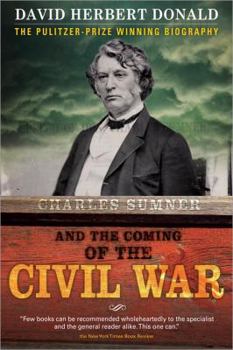Charles Sumner and the Coming of the Civil War
(Book #1 in the Charles Sumner Series)
Select Format
Select Condition 
Book Overview
The Puliter-Prize winning classic and national bestseller returns In this brilliant biography--a Pulitzer Prize--winning national bestseller--David Herbert Donald, Harvard professor emeritus, traces Sumner's life as the nation careens toward civil war. In a period when senators often exercised more influence than presidents, Senator Charles Sumner was one of the most powerful forces in the American government and remains one of the most controversial...
Format:Paperback
Language:English
ISBN:1402218397
ISBN13:9781402218392
Release Date:March 2009
Publisher:Sourcebooks
Length:432 Pages
Weight:1.36 lbs.
Dimensions:1.1" x 6.5" x 9.0"
Customer Reviews
2 ratings
An excellent book on a great American
Published by Thriftbooks.com User , 16 years ago
This book takes up the story of Charles Sumner from the beginnning of his involvement with the anti-slavery cause and up to the beginning of the Civil War. This and the companion book, Charles Sumner and the Rights of Man are landmark books in a way since they served to alter fundamentally the way we see the great anti slavery figures of the abolitionist cause. Sumner's career was set as a brilliant, if at times, tactless representative of the anti-slavery cause. Sumner began early, studying at the feet of John Quincy Adams and formulating notions of the law and human rights that led to his pre-war prominance. Until the Civil War, Sumner was the most prominent figure for anti-slavery. The senate proved a bully pulpit when most other national figures tried to wish away the controvery of slavery, Sumner gloried in denouncing the practice. It was because of this that he was savagely beaten by Preston Brooks on the Senate floor and returned by the people of Mass. even though he spent two years attempting to recover. This book captures the man and shows how he was great not in spite of his faults, but because of them.
Superb Americana
Published by Thriftbooks.com User , 24 years ago
The author focuses his attention on Sumner's pre-Civil War years when his influence on behalf of the Union and the antislavery cause reached its zenith.David Donald is renowned for his meticulous research and well written books. He used diaries, manuscripts, scrapbooks, family histories, letters, newspaper files, and valued secondary sources to flesh out his subject. Donald spent ten years on this book and during that time had to absorb the arcane knowledge of the 19th century in such subjects as medicine, law, politics, etc. His scholarship is impeccable. Though forty years have elapsed since the original publication of this book it still satisfies both the casual and serious reader.If a theme can be assigned to this very good book, it would be, "Sumner was a man who wouldn't compromise his principles no matter the cost." Sumner believed, "...to sanction the enslaving of a single human being was an act which cannot be called small, unless the whole moral law which it overturns or ignores is small." He was convinced that the appeasement of slave holders was impossible; that the various compromises enacted by the Senate were abdications of Northern principle in order to placate the South and to forestall an inevitable constitutional crisis. Sumner pointed out that supporters of the Compromise of 1850 were in fact extreme sectionalists, while antislavery agitators were the true nationalists.The author points out that slavery was the one great issue beginning in the late 1840s and continuing through the Civil War. Sumner battled the "peculiar institution" for years and made the abolition of slavery paramount. He became the chairman of the Senate Committee on Foreign Relations, a post which he made more important than that of any Ambassador and more influential than that of the Secretary of State of the United States. By 1851, Sumner was one of the most powerful men on the North American continent and was known throughout Europe.When first viewing slaves Sumner said, "They appear to be nothing more than moving masses of flesh, unendowed with anything of intelligence above the brutes." This book clearly illustrates why his opinion changed and why this complex man fought the lonely fight to remove all legal barriers that sustained racial discrimination. Sumner believed such discrimination fostered racial inferiority and was psychologically harmful to Blacks. He believed the pledge in the Declaration of Independence for universal equality was as much a part of the public law of the land as the Constitution.In this regard, Sumner continually excoriated the public to reform slavery and eventually influenced hundreds of thousands of Northern voters. When read today, his fiery speeches seem ponderous and stilted. Further, Sumner often used illogical reasoning and had a tendency to extend a principle to its utmost limits - he could be irritating and obtuse at time. Regardless, he was a powerful spokesman





